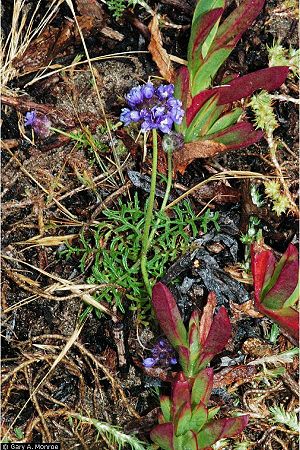Difference between revisions of "Gilia capitata"
From Puget Prairie Plants
| Line 5: | Line 5: | ||
===Taxonomy=== | ===Taxonomy=== | ||
| + | |||
| + | *Kingdom: Plantae <br> | ||
| + | *(unranked): Angiosperms <br> | ||
| + | *(unranked): Eudicots <br> | ||
| + | *(unranked): Asterids <br> | ||
| + | *Order: Ericales <br> | ||
| + | *Family: Polemoniaceae <br> | ||
| + | *Genus: Gilia <br> | ||
| + | *Species: G. capitata <br> | ||
| + | |||
===Description=== | ===Description=== | ||
Revision as of 10:47, 30 April 2012
Gilia capitata also known as Blue gilia, Blue thimble flower, Globe gilia, Blue-head-gily-flower is in the Polemoniaceae family.
Contents
Taxonomy
- Kingdom: Plantae
- (unranked): Angiosperms
- (unranked): Eudicots
- (unranked): Asterids
- Order: Ericales
- Family: Polemoniaceae
- Genus: Gilia
- Species: G. capitata
Description
- General: Erect, slender, sparingly-branched annual, the glabrous to stipitate-glandular stem 1.5-10 dm. tall.
- Leaves: Leaves basal and cauline, the lower bipinnatifid with slender rachis and narrow ultimate segments; reduced upward and becoming pinnatifid.
- Flowers: Flowers sessile in dense, 50- to 100-flowered heads terminating the stem and branches; corolla bluish, 6-10 mm. long, the 5 slender lobes about equaling the tube; calyx with prominent translucent intervals between the 5 herbaceous segments; filaments inserted in the sinuses of the corolla, about equal to the lobes; style 3-parted; ovary superior.
- Fruit: Capsules with 3 carpels, each with 2, 3 or 0 seeds; become mucilaginous when wet.
Bloom Period
Distribution
Habitat
Uses
Propagation
Seed
Abbreviation: GICA
Seed sample from: 2011
Average Measurement: 1.7 x 1.1 x 0.7
Measurement Range: L: 1.2 – 2, W: 0.75 – 1.4, D: 0.5 – 1.1
Features
Shape: Seed narrow at hilium end, broadening at opposite apex. Hilium inconspicuous. Uniformity in shape is not that common, but most seeds take a relatively teardrop shaped.
Color: Seed is brown, very bumpy, and slightly lustrous.
Surface: Seed coat becomes very mucilaginous and stringy when wet.
Could be confused with COGRX, but GICA is about ½ the size and does not have sulcus.
Latitudinal Cross Section: elliptical ![]()
Longitudinal Cross Section: obovate ![]()

